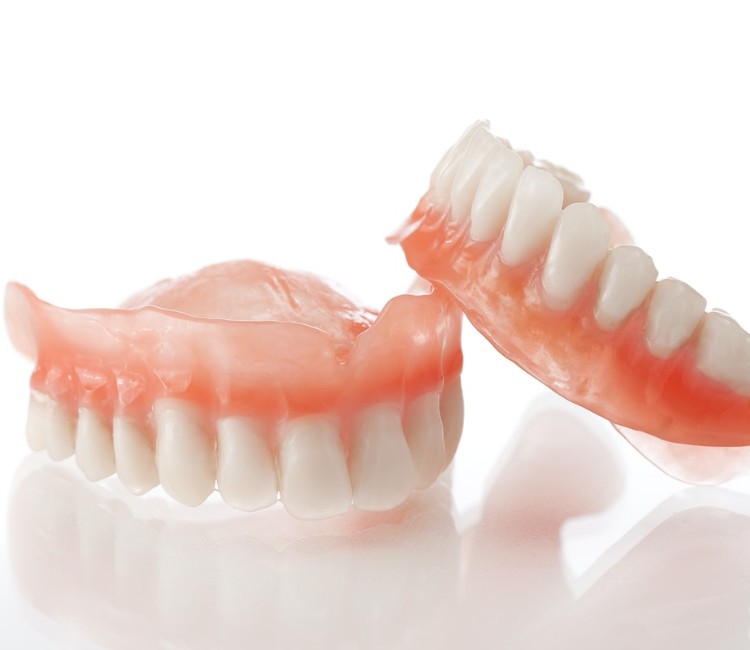Just like taking care of your natural teeth, you need to know what proper denture care is and how to make it a part of your daily routine. Familiarizing yourself with these denture care instructions will help you keep your dentures in great condition and functioning well. Good oral care should continue even though you no longer have your natural teeth.
Daily Cleaning Is Essential In Good Denture Care
Brushing dentures daily should be an important part of a denture care routine. You can still develop plaque on your dentures, so it is imperative to brush with a soft bristled denture brush made specifically for dentures. Your dentures can be brushed with warm water, mild soap or denture paste, just make sure it is a product approved by the ADA that shows their Seal of Acceptance. A company earns the ADA Seal of Acceptance by producing scientific evidence that demonstrates the safety and efficacy of its product, so you can feel content in knowing it has been tested and is safe to use.
Commercial toothpaste is very abrasive and should not be used on dentures, as it can create small grooves and scratches in the acrylic, where plaque and stains can build up and allow bacteria to grow.
If possible, you should rinse out your mouth and rinse off your dentures after every meal to remove food debris. Never soak or rinse in excessively hot water, as it can warp your denture, causing it to fit poorly. The use of cleaning tablets while your dentures are soaking is something you should strongly consider, as the tablets help loosen plaque buildup and remove light stains.
When your dentures are not in your mouth, they should be soaking in water, preferably with cleansing tablets. Otherwise, over time, the acrylic will dry out, causing them to lose their shape and not fit as well. Not soaking them can also cause them to become brittle, which increases the chance of breaking them.
Oral Care for Gum and Mouth Tissues
It is not recommended to wear your dentures 24/7, as your gum tissue needs time to breathe. This also assists in avoiding irritation, discomfort, and infection of the soft tissue beneath your dentures.
After removing the denture, use a very soft toothbrush or dampened warm washcloth to clean the tissues inside of your mouth. Wipe the ridges where the dentures sit, along with the roof of the mouth, inside of the cheeks, the tongue and lips. A daily rinsing with alcohol-free mouthwash or lukewarm salt water can help keep your gums clean.
If you develop sores in your mouth, especially on the ridges where the denture sits, it can be a sign of an ill-fitting denture that is putting too much pressure on a particular area of your soft oral tissues. This often happens when dentures are new, but can also happen to veteran denture wearers. When this happens, you should call your dentist and make an appointment as soon as possible. The dentist should be able to make the appropriate adjustment and have you smiling again in no time!
Dentures should never be cleaned with bleach or powdered household cleaning agents. These products are abrasive and could damage your dentures as well as make you sick if they are not rinsed properly and you ingest the cleaning agent.
Never try to repair or adjust your dentures yourself, as you can very easily damage them and make a poor-fitting denture even worse. Denture adhesives come in the form of powders, strips or wafers. They are used to hold dentures securely in place and form a seal that keeps food particles from getting lodged between the dentures and the gums. Denture adhesive should be removed during denture care with a gentle scrubbing action to assure removal of all bacteria and so no build-up of product causes the dentures to not fit well.
Typically, a film of saliva helps form a bond between the dentures and gums, but if the salivary glands do not produce enough saliva, denture adhesives are a good choice to help hold the dentures in place. Adhesives, however, are not a good fix for poorly fitting dentures. If your dentures feel loose or cause discomfort, they may need to be relined or replaced, so as not to contribute to sores in your mouth or difficulty chewing and eating.
At Good Samaritan Dental Implant Institute your dental health is our number one priority. If you think you may need dentures or are having difficulty with the ones you already have, make an appointment for a consultation. We would love to help you have the best smile possible!

